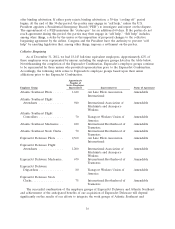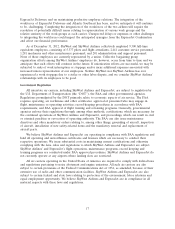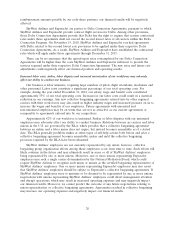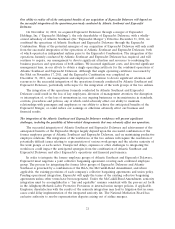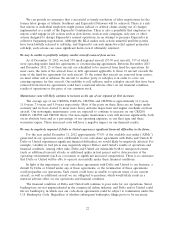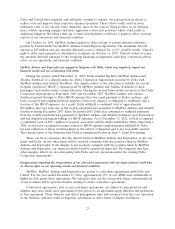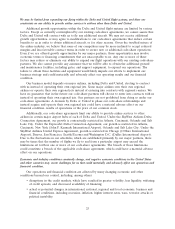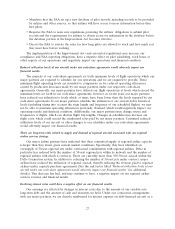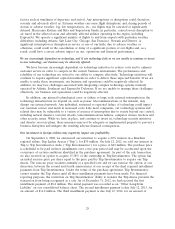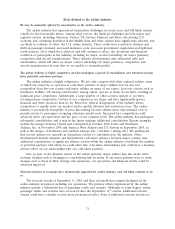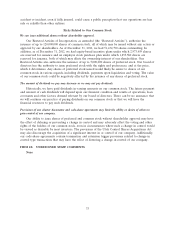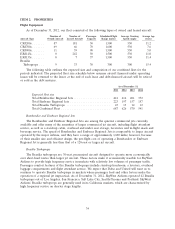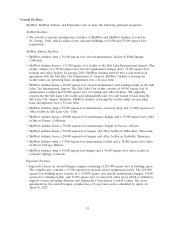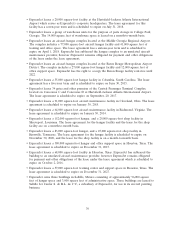SkyWest Airlines 2012 Annual Report Download - page 30
Download and view the complete annual report
Please find page 30 of the 2012 SkyWest Airlines annual report below. You can navigate through the pages in the report by either clicking on the pages listed below, or by using the keyword search tool below to find specific information within the annual report.• changes in consumer preferences, perceptions, spending patterns or demographic trends;
• changes in the competitive environment due to industry consolidation and other factors;
• actual or potential disruptions to U.S. air traffic control systems;
• outbreaks of diseases that affect travel behavior; and
• weather and natural disasters.
The aggregate effect of any, or some combination, of the foregoing economic and industry
conditions on our operations or financial condition is virtually impossible to forecast; however, the
occurrence of any or all of such conditions in a significant manner could materially and adversely affect
our operations and financial condition.
We have been adversely affected by increases in fuel prices, and we would be adversely affected by disruptions
in the supply of fuel.
Dependence on foreign imports of crude oil, limited refining capacity and the possibility of
changes in government policy on jet fuel production, transportation and marketing make it impossible
to predict the future availability of jet fuel. If there are additional outbreaks of hostilities or other
conflicts in oil-producing areas or elsewhere, or a reduction in refining capacity (due to weather events,
for example), or governmental limits on the production or sale of jet fuel, there could be a reduction in
the supply of jet fuel and significant increases in the cost of jet fuel. Major reductions in the availability
of jet fuel or significant increases in its cost, or a continuation of current high prices for a significant
period of time, would have a material adverse impact on us.
Pursuant to our contract flying arrangements, our major partners have agreed to bear the
economic risk of fuel price fluctuations on our contracted flights. We bear the economic risk of fuel
price fluctuations on our pro-rate operations. As of December 31, 2012, essentially all of our Brasilia
turboprops flown for Delta were flown under pro-rate arrangements, while approximately 60% of our
Brasilia turboprops flown in the United system were flown under pro-rate arrangements. As of
December 31, 2012, we operated 17 CRJ200s under a pro-rate agreement with United. We also operate
nine CRJ200 under a pro-rate agreement with Delta and one CRJ200 under a pro-rate arrangement
with US Airways. Our operating and financial results with respect to these pro-rate arrangements can
be affected by the price and availability of jet fuel and in the event we are unable to pass on increased
fuel prices to our pro-rate customers by increasing fares our financial performance would be adversely
impacted.
The Airline Safety and Pilot Training Improvement Act of 2009 could negatively affect our operations and our
financial condition.
Prompted by the crash of a Colgan aircraft in 2009, near Buffalo, New York, passengers and
governmental authorities have raised questions about pilot qualifications, training and fatigue. The
Airline Safety and Pilot Training Improvement Act of 2009 (the ‘‘Improvement Act’’) was enacted in
August of 2010. The Improvement Act adds new certification requirements for entry-level commercial
pilots, requires additional emergency training, improves availability of pilot records and mandates
stricter rules to minimize pilot fatigue.
The Improvement Act also:
• Requires that all airline pilots obtain an Airline Transport Pilot license, which was previously
only required for captains.
26


